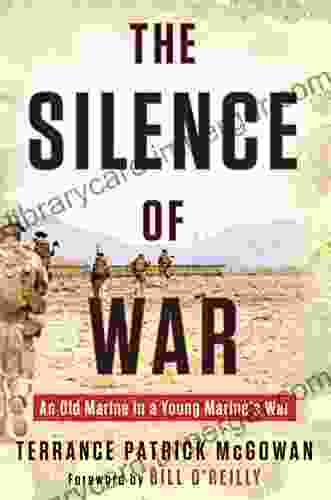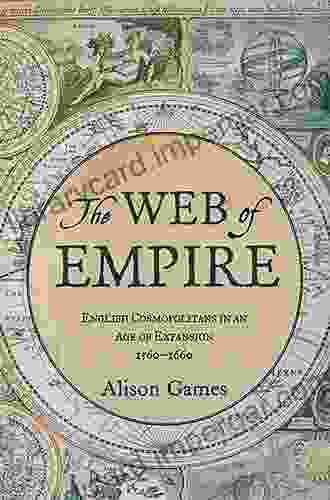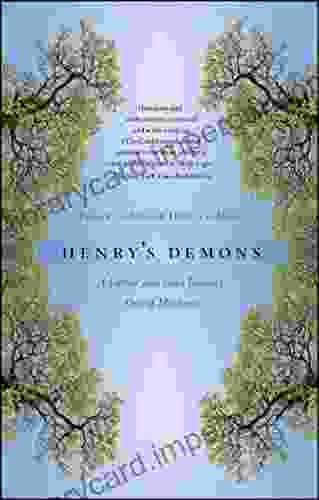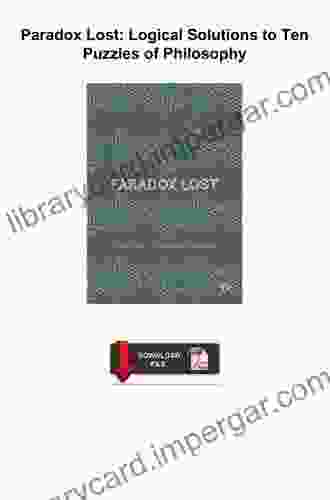Logical Solutions to Ten Puzzles of Philosophy: Unveiling the Enigmas of Existence

: Embarking on a Philosophical Quest
Philosophy, the quest for knowledge and understanding of the fundamental nature of reality, has captivated human minds for millennia. Its profound questions delve into the complexities of existence, inviting exploration of concepts that transcend everyday experience. This article invites you on an intellectual journey to explore ten perplexing philosophical puzzles that have sparked debate and contemplation throughout history. With logical precision, we will unravel the enigmatic threads of these philosophical challenges, offering logical solutions that illuminate the path to enlightenment.
Puzzle 1: The Problem of Induction
4 out of 5
| Language | : | English |
| File size | : | 4641 KB |
| Text-to-Speech | : | Enabled |
| Screen Reader | : | Supported |
| Enhanced typesetting | : | Enabled |
| Word Wise | : | Enabled |
| Print length | : | 354 pages |
David Hume famously questioned the validity of inductive reasoning, the process of inferring general principles from specific observations. For instance, we assume that the sun will rise tomorrow based on our past experiences of its daily appearance. However, Hume argued that there is no logical necessity for this assumption, as an infinite number of past sunrises do not guarantee its future occurrence.
Solution:
Contemporary philosophers have proposed several solutions to the problem of induction. One approach involves the concept of "inference to the best explanation." Here, we infer that the sun will rise tomorrow because it is the most plausible explanation given our current knowledge and past experiences. This solution acknowledges the tentative nature of inductive reasoning but provides a reasonable basis for predicting future events.
Puzzle 2: The Trolley Problem
A classic ethical dilemma, the trolley problem presents a scenario where a runaway trolley threatens to kill five people on the main track. You have the option to divert the trolley to a side track, saving the five but killing one person on that track. Do you pull the lever or let the five die?
Solution:
Philosophers have proposed various approaches to the trolley problem. One view, known as "utilitarianism," argues that the best action is the one that produces the greatest overall happiness. In this case, diverting the trolley to save the five would be the utilitarian choice. Another perspective, called "deontology," emphasizes following moral rules and obligations. It may argue that it is wrong to kill one person, even to save five others. Ultimately, the solution depends on one's ethical framework and values.
Puzzle 3: The Ship of Theseus
This ancient puzzle questions the nature of identity. Imagine a ship whose parts are gradually replaced over time, plank by plank, until none of the original materials remain. Is it still the same ship?
Solution:
Philosophers have debated various criteria for identity. One common approach is the "functionalist" view, which states that the identity of an object depends on its function. In the case of the ship, as long as it continues to serve its purpose of transportation, it can be considered the same ship, even if its physical parts have changed.
Puzzle 4: The Paradox of Free Will
The paradox of free will questions the compatibility of human freedom with determinism. Determinism argues that every event is caused by a prior event, making human actions predetermined. How, then, can we have free will if our actions are dictated by external forces?
Solution:
Philosophers have proposed different ways to reconcile free will and determinism. One view, called "compatibilism," argues that free will does not require absolute freedom but rather the ability to act according to one's desires and intentions. Even if our actions are influenced by external factors, we can still have free will if we have the capacity to make choices and act on them.
Puzzle 5: The Problem of Evil
The problem of evil challenges the existence of a benevolent and omnipotent God. If God is all-good and all-powerful, why does evil exist?
Solution:
Philosophers have proposed several responses to the problem of evil. One approach, called "theodicy," attempts to justify the existence of evil by arguing that it serves a greater good or is necessary for human growth and development. Another view, known as "free will defense," suggests that evil is a consequence of human freedom and choice.
Puzzle 6: The Meaning of Life
The question of life's meaning has perplexed philosophers throughout the ages. What is the purpose of our existence?
Solution:
There is no one definitive answer to this question, as the meaning of life is subjective and varies from person to person. Some philosophers argue that we create our own meaning through our actions and choices, while others suggest that life's meaning is found in fulfilling our potential or connecting with a higher purpose.
Puzzle 7: The Matrix Hypothesis
This philosophical puzzle raises the question of whether our reality is a simulation. Could we be living in a computer-generated world, unaware of our true nature?
Solution:
While the Matrix hypothesis is an intriguing thought experiment, there is no scientific evidence to support its claim. However, it invites us to consider the nature of our perception and the limits of our knowledge.
Puzzle 8: The Shipwrecked Sailors
A thought experiment by the philosopher Derek Parfit, the shipwrecked sailors puzzle poses a moral dilemma. A group of shipwrecked sailors board a lifeboat designed for six people. As they sail, they encounter two other sailors who have been stranded at sea. They must decide whether to rescue the two additional sailors, knowing that ng so will overcrowd the lifeboat and increase the risk of sinking.
Solution:
This puzzle highlights the balance between individual survival and the moral obligation to help others. Some argue that the sailors should prioritize their own safety, while others suggest that they should take the risk and rescue the additional sailors, even if it endangers their own lives.
Puzzle 9: The Paradox of Tolerance
The paradox of tolerance questions the limits of tolerance in society. How do we balance the right to free speech with the need to protect vulnerable groups from harmful or offensive ideas?
Solution:
Philosophers have proposed different approaches to the paradox of tolerance. Some argue that intolerance of intolerance is necessary to preserve society's values, while others suggest that a more nuanced and contextual approach is required, balancing freedom of expression with respect for human dignity.
Puzzle 10: The Argument from Ignorance
The argument from ignorance fallacy occurs when someone claims something is true because it has not been proven false, or vice versa.
Solution:
This fallacy highlights the importance of evidence and logical reasoning in making claims about the world. Asserting something is true simply because it has not been proven false is an unreliable and unscientific approach to knowledge acquisition.
: Unraveling the Mysteries of Existence
Our exploration of these ten philosophical puzzles has provided a glimpse into the complex and fascinating nature of human inquiry. While there may not be universally agreed-upon answers to these profound questions, the act of engaging with them sharpens our critical thinking skills, expands our perspectives, and deepens our understanding of the world around us. By unraveling the enigmatic threads of philosophy, we embark on a lifelong journey of intellectual growth and enlightenment, striving to illuminate the mysteries of existence one puzzle at a time.
4 out of 5
| Language | : | English |
| File size | : | 4641 KB |
| Text-to-Speech | : | Enabled |
| Screen Reader | : | Supported |
| Enhanced typesetting | : | Enabled |
| Word Wise | : | Enabled |
| Print length | : | 354 pages |
Do you want to contribute by writing guest posts on this blog?
Please contact us and send us a resume of previous articles that you have written.
 Book
Book Novel
Novel Page
Page Chapter
Chapter Text
Text Story
Story Genre
Genre Reader
Reader Library
Library Paperback
Paperback E-book
E-book Magazine
Magazine Newspaper
Newspaper Paragraph
Paragraph Sentence
Sentence Bookmark
Bookmark Shelf
Shelf Glossary
Glossary Bibliography
Bibliography Foreword
Foreword Preface
Preface Synopsis
Synopsis Annotation
Annotation Footnote
Footnote Manuscript
Manuscript Scroll
Scroll Codex
Codex Tome
Tome Bestseller
Bestseller Classics
Classics Library card
Library card Narrative
Narrative Biography
Biography Autobiography
Autobiography Memoir
Memoir Reference
Reference Encyclopedia
Encyclopedia Thomas Wirth
Thomas Wirth Diogenes Laertius
Diogenes Laertius Karin Cadwell
Karin Cadwell Antony Adler
Antony Adler Frances De Talavera Berger
Frances De Talavera Berger Alice Finch
Alice Finch Alan Watts
Alan Watts Amanda D Lotz
Amanda D Lotz Hillel Levin
Hillel Levin Gil Nelson
Gil Nelson David Horowitz
David Horowitz Marlon Bermudez
Marlon Bermudez Ronald Hayman
Ronald Hayman Allison Karmel Thomason
Allison Karmel Thomason Allen Childs Md
Allen Childs Md Allan Ford
Allan Ford Jocko Willink
Jocko Willink William John Cox
William John Cox Alex Bruce
Alex Bruce Ambani Anselom Guyi
Ambani Anselom Guyi
Light bulbAdvertise smarter! Our strategic ad space ensures maximum exposure. Reserve your spot today!

 Ray BlairAn Old Marine in Young Marine's War: A Gripping Memoir of Loyalty, Sacrifice,...
Ray BlairAn Old Marine in Young Marine's War: A Gripping Memoir of Loyalty, Sacrifice,...
 Christian BarnesWitness Heavenly Wonders: Explore the Cosmos with "Eyes to the Skies Look...
Christian BarnesWitness Heavenly Wonders: Explore the Cosmos with "Eyes to the Skies Look...
 Alexandre DumasUnveiling the Secrets of Colonialism and Resistance: Dive into "The Web of...
Alexandre DumasUnveiling the Secrets of Colonialism and Resistance: Dive into "The Web of... Carter HayesFollow ·7.7k
Carter HayesFollow ·7.7k Brody PowellFollow ·16.3k
Brody PowellFollow ·16.3k Jerry WardFollow ·12.5k
Jerry WardFollow ·12.5k Allan JamesFollow ·19k
Allan JamesFollow ·19k Harold PowellFollow ·11.7k
Harold PowellFollow ·11.7k Matt ReedFollow ·6.7k
Matt ReedFollow ·6.7k George R.R. MartinFollow ·12.5k
George R.R. MartinFollow ·12.5k Nick TurnerFollow ·17.3k
Nick TurnerFollow ·17.3k

 Ignacio Hayes
Ignacio HayesUnveiling the Secret Spitfires: Britain's Hidden Civilian...
: The Untold Story of Britain's...

 Scott Parker
Scott ParkerLiving With Schizophrenia: A Father and Son's Journey
Schizophrenia is a serious...

 Ted Simmons
Ted Simmons"From Sign Up to Pass Out": The Shocking and Immersive...
Step into the...

 John Keats
John KeatsThe Development of Biographies and Philosophical...
The Alluring...

 Dan Brown
Dan BrownCapture Your Dream Wedding with Digital Wedding...
Your wedding day is...
4 out of 5
| Language | : | English |
| File size | : | 4641 KB |
| Text-to-Speech | : | Enabled |
| Screen Reader | : | Supported |
| Enhanced typesetting | : | Enabled |
| Word Wise | : | Enabled |
| Print length | : | 354 pages |








